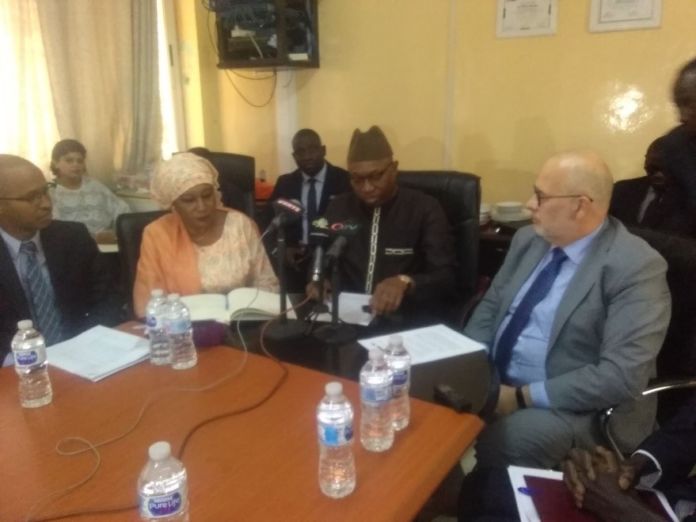By Nelson Manneh
The International Monetary Fund (IMF) has on Tuesday, the 11th February 2020, reached agreement with the Gambia on staff-level which will be supported under the Extended Credit Facility.
The IMF team led by Mr. Jaroslaw Wieczorek, visited Banjul from February 3rd to 11th 2020 and took stock of the 2019 SMP implementation and agreed with the Gambian authorities on policies underpinning their request for a three-year programme that could be supported by an ECF arrangement in the amount of SDR 35 Million which is around 48 Million US Dollars.
Mr. Jaroslaw Wieczorek who led the IMF team to The Gambia said The Gambia has built a positive track record of performance and advanced the structural reform agenda under the 2019 Staff Monitored Program (SMP), adding the restructuring of The Gambia’s external debt is being finalized following commitments provided by participating creditors, that the Gambia is requesting a three-year programme to be supported by a financial arrangement under the Extended Credit Facility (ECF).
Mr. Wieczorek said the Gross Domestic Product (GDP) growth in 2019 is estimated to have reached 6% despite the temporary drop in Tourist arrival in November 2019 following the bankruptcy of Thomas Cook (UK) and a much lower Agricultural output due to the erratic rainfall.
“This strong performance reflected The Gambia’s gaining competitiveness as a Tourist destination, strong private sector consumption and investment supported by foreign exchange inflows, availability of credit, and a much-improved reliability of electricity and water supply,” he said.
Mr. Wieczorek said over the medium term, sound macroeconomic policies will underpin the prospects for sustaining growth, the strengthening of foreign exchange buffers, and inflation moderating from an average of 7.1% in 2019 to the Central Bank of The Gambia’s target of 5%.
The leader of the IMF team who visited The Gambia, said The Gambia’s performance under the 2019 SMP has been strong. Quantitative targets including on domestic borrowing by the government and on poverty-reducing spending were met, he added.
He said the implementation of the 2019 budget was accompanied by strong tax revenue effort, improved expenditure control and debt management.
“Measures were taken to enable the clearing of domestic payment arrears with suppliers and among state-owned enterprises,” he said.
Mr. Wieczorek said the Gambia is making concerted efforts to bridge government gaps, tackle the vulnerability to corruption and take concrete actions to prosecute human traffickers.
“The work of the Janneh Commission and the Truth, Reconciliation and Reparation Commission have been particularly laudable, helping to identify past corruption, laying the basis for asset recovery and dispensing justices to the victims of the previous regime,” he said.
He said that the draft Anti-Corruption Bill, recently submitted to the National Assembly, is expected to increase efficiency in tackling corruption.
“The Gambia has made much needed progress on the restructuring of its external debt, that debt service deferrals agreed with most of participating creditors, have markedly improved The Gambia’s debt outlook and enabled it to exit from debt distress,” he said.
The IMF leader said, nevertheless, great care is needed to avoid contracting any new non-concessional debt, given the high level of the public debt and the large existing pipeline of the already contracted project loans.
“The IMF will submit, for the consideration of its Executive Board, a report on the assessment of the 2019 SMP and supporting The Gambian authorities’ request for a program supported under an ECF arrangement,” he noted.
Hon. Mambury Njie the Minister for Finance and Economic Affairs said the contribution of Agriculture and Tourism to the GDP of this country is significant.
He said they are ready to work with external partners especially IMF to achieve their objectives.



















